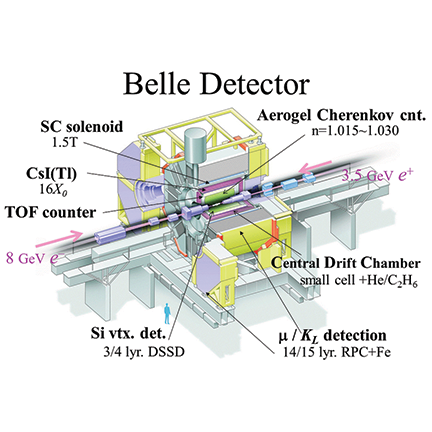 Having spent many years working at the Cornell Electron Storage Rings at Cornell, Prof. John Yelton is now working at the KEKB accelerator in Japan. KEKB produces electron-positron annihilations; the Belle experiment detects the results of these annihilations. The objective is to study details of new quark states and couplings. The energy range of the accelerator is around 10 GeV center-of-mass, which is perfect for investigating the B meson system, and in addition, many charmed particles are produced. Physics has been performed in this energy range for almost 40 years, but breakthroughs in technology allow vast datasets to now be collected, allowing for much rarer processes to be formed in this very clean environment. The data from KEKB is analyzed at computer farms in Japan. This has led to many discoveries concerning in particular rare decays of B mesons and new charmed baryon and hyperon states. Measurements such as these provide fundamental tests of the Standard Model description of strong, electromagnetic and weak decays. Belle refers to the detector that stopped taking data in 2013 (but analysis continues…), Belle II will be fully operational in 2019 and will stand alone as the premier detector in this field.
Having spent many years working at the Cornell Electron Storage Rings at Cornell, Prof. John Yelton is now working at the KEKB accelerator in Japan. KEKB produces electron-positron annihilations; the Belle experiment detects the results of these annihilations. The objective is to study details of new quark states and couplings. The energy range of the accelerator is around 10 GeV center-of-mass, which is perfect for investigating the B meson system, and in addition, many charmed particles are produced. Physics has been performed in this energy range for almost 40 years, but breakthroughs in technology allow vast datasets to now be collected, allowing for much rarer processes to be formed in this very clean environment. The data from KEKB is analyzed at computer farms in Japan. This has led to many discoveries concerning in particular rare decays of B mesons and new charmed baryon and hyperon states. Measurements such as these provide fundamental tests of the Standard Model description of strong, electromagnetic and weak decays. Belle refers to the detector that stopped taking data in 2013 (but analysis continues…), Belle II will be fully operational in 2019 and will stand alone as the premier detector in this field.
This picture of the Belle detector with annotations is useful for getting a quick understanding.
Investigators
John Yelton (Faculty) Igal Jaegle (Senior Post-Doc)
For more information, please see the web pages for Belle and Belle II